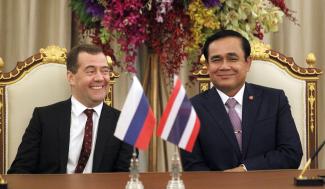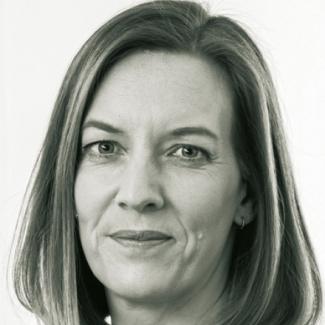Comment
Thai-style democracy
 Sakchai Lalit/AP
Sakchai Lalit/AP
When army chief Prayuth Chan-o-cha took over in an unbloody coup on 22 May 2014, he made two major promises: to return happiness to the Thai people and to return, as soon as possible, democracy to the country. The first promise has certainly not been fulfilled for thousands of academics, journalists, politicians and critics of the monarchy who have been harassed, prosecuted, jailed or forced into exile. The second promise looks ever more cynical the longer the military dictatorship lasts.
Indeed, the ruling junta with Prayuth at the helm has sent democracy into free fall. It has suspended the constitution and replaced it with an interim charter that basically allows the generals to do what they want. It has restricted all fundamental rights. It controls the media, censors the internet and suppresses free speech. It tries civilians before military courts. The human-rights situation has gone from bad to worse.
In April, more than 10 months after its imposition, martial law was lifted. But that did not make any difference. Prayuth replaced it with an order that gives military officers even more power than before – for the sake of “national security” and “public order”.
Prayuth formally lifted martial law because he worried about Thailand’s reputation. He feels pressure from the international community and wants to silence foreign critics. Even the generals know that economic prosperity is impossible without partners. Thailand depends on trade and tourism. Prayuth’s manoeuvring actually satisfied some foreign observers.
The majority of the Thai people seems just to be waiting for times to change. Their experience shows that this can happen fast. Since absolute monarchy was abolished in 1932, the country has seen 12 successful military coups. It was governed by 29 prime ministers, some of them elected, some not. It had 17 constitutions. The people are used to political instability.
While the people keep still, the same can be said about the political opposition. Thailand is politically polarised. Thaksin Shinawatra, the secret leader of the Pheu Thai party that ruled the country under his sister Yingluck before the coup, is watching the situation from exile. As prime minister, he was himself ousted by the military in 2006 and fled the country after being charged for corruption. His support base is still strong, especially in poor rural areas. If there are free elections one day, his party is likely to win again. Everybody knows that, including Prayuth, who belongs to the nationalist establishment that always opposed Thaksin and his populist approach.
Some Thaksin followers were ready to revolt after the coup, but Thaksin is pursuing a different strategy: to let Prayuth run dry and to avoid major bloodshed. He knows his familiy’s next turn will come.
Meanwhile, Yingluck has been neutralised: In January, she was impeached by parliament and banned from politics for five years. Her opponents are trying to make her pay for her mistakes as prime minister from 2011 to 2014. Apart from several other legal proceedings, the Supreme Court has accepted a case in which she is accused of negligence in a controversial rice-subsidy scheme. If found guilty, she may be sent to jail.
King Bhumibol Adulyadej is no help either. The political role of the world’s longest-reigning monarch is reduced to granting stability through the mere fact of still being alive. The 87 year-old is very ill and his succession unsolved. This is a matter of great concern.
Today, the decision to restore democracy in Thailand seems to depend solely on the whims of Prayuth and his advisors. The general makes no secret of the fact that he deems “western democracy” inappropriate for Thailand. Instead, he favours what he calls “Thai-style democracy”. He still owes the world a definition for that concept. It is probably nothing more than a nicer label for “dictatorship” – a term Prayuth really doesn’t like.
Katja Dombrowski is a member oft he D+C/E+Z’s editorial team. She lived in Thailand from 2011 to 2014.
euz.editor@fs-medien.de


